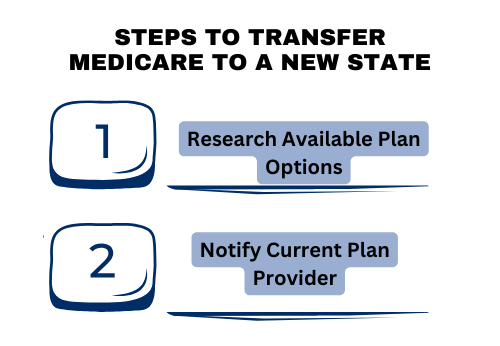
by Russell Noga | Updated December 14th, 2023
How to Transfer Medicare to Another State
Moving to a new state can be an exciting adventure, but it also comes with its own set of challenges, like figuring out how to transfer Medicare to another state. Fear not!
We’ve got you covered with a step-by-step guide to ensure a seamless transition, so you can focus on settling into your new home without worrying about your healthcare coverage.
Key Takeaways
- Understand Medicare options when relocating and utilize resources to research available plans.
- Notify the current plan provider of the move and enroll in the new Part D plan during the Special Enrollment Period.
- Find new healthcare providers, and coordinate medical records transfer for continuity of care.
Understanding Medicare Options When Moving to Another State
 Prior to your move, comprehending your Medicare options and their transferability is vital. Various Medicare plans follow different rules and procedures for transferring coverage across state lines.
Prior to your move, comprehending your Medicare options and their transferability is vital. Various Medicare plans follow different rules and procedures for transferring coverage across state lines.
Therefore, we will examine the details of Original Medicare, Medicare Advantage, and Medigap plans.
Original Medicare Transfer Process
Transferring Original Medicare, which includes Part A and Part B, is a straightforward process. All you need to do is:
- Update your address
- Find a new primary care physician who accepts Medicare in your new state
- Conveniently update your details online
- You have a three-month window – the month before your move and the two months following it – to switch to a new plan.
During the transfer of Original Medicare, you must fill out and submit certain documents and forms, including:
- Authorization Agreement for Electronic Funds Transfer Authorization Agreement (CMS-588)
- CMS-855B form
- CMS-L564 form
- CMS-10106 form
These forms can be found on the official Medicare website or through the Centers for Medicare & Medicaid Services (CMS) forms page.
View Medicare Rates for 2024
Enter Zip Code
Transferring Medicare Advantage Plans
Unlike Original Medicare, transferring Medicare Advantage plans (Part C) requires additional steps due to their regional nature. When relocating, you’ll need to enroll in a new Medicare Advantage plan available in your new location during a Special Enrollment Period.
This period provides you with the opportunity to switch plans outside of the regular open enrollment period, including Part D prescription drug plans.
The consequences of not notifying your Medicare Advantage plan or stand-alone Medicare prescription drug plan of your move can be severe.
Failure to provide notice may result in denial of coverage when obtaining medical services in the new state, and your old plan may terminate your enrollment, reverting you to Original Medicare, Part A, and Part B. To avoid these issues, it’s crucial to notify Medicare about your change of address.
Relocating with Medigap Plans
Medigap plans, also known as Medicare Supplement plans, are designed to cover costs not included in Original Medicare and can be used nationwide.
However, address changes may affect your premiums and require underwriting for new plans. When relocating, follow these steps:
- Update your address with your plan’s carrier.
- Assess the pricing available in your new area.
- Consider changing to a different Medigap plan offered in your new location.
Medicare Supplement plan enrollees have the privilege of Guaranteed Issue Rights, allowing them to enroll in a new plan without answering any health-related questions. This makes the process of relocating with a Medigap plan smoother and less stressful.
Steps to Transfer Medicare to a New State
Having understood the various Medicare options and their transferability, we can now proceed to the steps needed to transfer medicare to another state, including medicare benefits, when moving your Medicare coverage.
We’ll discuss researching available plan options and notifying your current plan provider to ensure a seamless transition.
Research Available Plan Options
Researching the Medicare plans available in your new state is key to ensuring a smooth transition and preventing coverage gaps.
 To find and compare plans, you can visit the official Medicare website at medicare.gov and use tools such as the Medicare Plan Finder. Additionally, you can call 1-800-MEDICARE for assistance with identifying plan options.
To find and compare plans, you can visit the official Medicare website at medicare.gov and use tools such as the Medicare Plan Finder. Additionally, you can call 1-800-MEDICARE for assistance with identifying plan options.
When researching plans, consider your specific healthcare needs, preferred doctors or specialists, and any other factors that may influence your choice.
Resources like Hellahealth’s Personal Shopper can help you identify plan options available in your new state.
Notify Current Plan Provider
Informing your current Medicare plan provider of your move is a crucial step in ensuring a successful transition. Contact your plan provider directly and provide them with your new address information.
If you’re enrolled in Original Medicare, you’ll also need to update your address with Social Security or the Railroad Retirement Board.
Remember, you have a three-month window – the month before your move and the two months following it – to switch to a new insurance company plan.
By notifying your plan provider promptly, you’ll avoid any lapses in coverage and ensure a smooth transition to your new state.
Addressing Prescription Drug Coverage Changes
Relocating to a new state necessitates addressing changes in prescription drug coverage, particularly if you possess a Medicare Part D plan. Let’s discuss enrolling in a new Part D plan to maintain your prescription drug coverage when you move to another state.
Enrolling in a New Part D Plan
 To keep your prescription drug coverage, enrollment in a new Part D plan within your new state’s service area during a Special Enrollment Period is required.
To keep your prescription drug coverage, enrollment in a new Part D plan within your new state’s service area during a Special Enrollment Period is required.
This 63-day period permits you to switch your Part D prescription drug plan without penalty. Early enrollment is advisable to prevent any coverage gaps.
When enrolling in a new Part D plan, verify that all your prescription drugs are covered by the plan to avoid any unexpected coverage issues. You can use the Medicare Plan Finder to compare Part D plans available in your new state.
Navigating Special Enrollment Periods for Medicare
Comprehending Special Enrollment Periods for Medicare becomes indispensable when you are relocating to another state.
These periods provide you with the opportunity to make changes to your Medicare coverage outside of the regular open enrollment period, such as switching Medicare Advantage plans or returning to Original Medicare.
Switching Medicare Advantage Plans
The Special Enrollment Period for switching Medicare Advantage plans includes the following options:
- Switching plans
- Transitioning from Original Medicare to Medicare Advantage
- Reverting to Original Medicare from Medicare Advantage
- Modifying your Medicare Part D plan
- Enrolling in Medicare Part D
This enrollment period begins one month prior to your moving out of state and extends for a duration of two months following your move.
Keep in mind that you can only switch Medicare Advantage plans during specific periods, such as the Fall Open Enrollment Period (October 15 to December 7) or within 12 months of joining the plan for the first time.
Returning to Original Medicare
If no suitable Medicare Advantage plans are available in your new location, you may consider returning to Original Medicare.
 To do so, visit your local Social Security Office and request to be disenrolled, or contact 1-800-MEDICARE to initiate your disenrollment.
To do so, visit your local Social Security Office and request to be disenrolled, or contact 1-800-MEDICARE to initiate your disenrollment.
Awareness of the costs associated with returning to Original Medicare is imperative. Coordination with your healthcare providers to guarantee the proper transfer of your medical records and treatment plans is crucial in preserving continuity of care under your original Medicare coverage.
Tips for Ensuring Continuity of Care
Ensuring consistent care while relocating is fundamental to your well-being. Let’s explore some tips for ensuring continuity of care, such as finding new healthcare providers and coordinating the transfer of your medical records.
Finding New Healthcare Providers
Upon settling down in your new state, identifying new healthcare providers who accept your Medicare plan is important to guarantee uninterrupted access to quality care.
You can use the official Medicare website at medicare.gov and the ‘Care Compare’ tool to:
- Search and compare doctors
- Search and compare hospitals
- Search and compare nursing homes
- Search and compare other healthcare providers
Aside from using online resources, you may also request referrals from your current healthcare providers. This will not only help you find new providers but also provide you with peace of mind knowing that your healthcare is in good hands.
Coordinating Medical Records Transfer
For maintaining consistent care, coordinating the transfer of your medical records to your new healthcare providers is of utmost importance.
The process can take between 5 and 10 days and requires submitting an authorization form to give permission for your records to be shared with the new doctor.

Ensuring proper transfer of your medical records is crucial for your new healthcare providers to have a complete understanding of your health history and provide appropriate care. Here are the steps to follow:
- Fill out the authorization form provided by your new healthcare provider.
- Specify on the form which types of records you want to transfer.
- Forward the completed authorization form to your current doctor or medical service provider.
Summary
Transferring Medicare to a new state doesn’t have to be a daunting task. By understanding your Medicare options, following the steps to transfer your coverage, and implementing tips for ensuring continuity of care, you can move with confidence and peace of mind.
Now that you’re equipped with the knowledge and resources needed for a seamless transition, you can focus on settling into your new home and enjoying your new community.
Compare Plans & Rates
Enter Zip Code
Frequently Asked Questions
Will my Medicare go with me if I move out of state?
Yes, your Medicare coverage will go with you if you move out of state, as long as you’re enrolled in Original Medicare, Part A, and Part B.
How do I change my Medicare when I move?
To change your Medicare when you move, update your information in your Social Security account or call Social Security at 1-800-772-1213.
Additionally, you can use the Medicare Plan Finder to search for Part D and Medicare Advantage plans in your new area. This may qualify you for a special enrollment period of at least two months to get a new plan.
What is the best state to live in if you’re on Medicare?
Minnesota, North Dakota, Massachusetts, California and Nebraska all have great Medicare systems with low prescription drugs and MOOP amounts for Medicare Advantage plans.
Additionally, Florida, New Mexico, Rhode Island, Alabama, South Carolina, Nevada and Nebraska are also highly affordable states for Medicare Advantage in 2023 with MOOP limits capped at $8,300. Therefore, these are the best states to live in if you’re on Medicare.
Do Medicare Advantage Plans offer coverage out of state?
Medicare Advantage Plans typically only offer emergency coverage if you are outside of your plan’s network. View your plan benefits to see coverage details as each plan and company are different.
How do I find healthcare providers that accept Medicare in my new state?
To find healthcare providers that accept Medicare in your new state, you can use the ‘Care Compare’ tool on medicare.gov.
Find the Right Medicare Plan for You
Finding the right Medicare Plan 2024 doesn’t have to be confusing. Whether it’s a Medigap plan, or you want to know how to transfer Medicare to another state, we can help.
Call us today at 1-888-891-0229 and one of our knowledgeable, licensed insurance agents will be happy to assist you!

Russell Noga is the CEO and Medicare editor of Medisupps.com. His 15 years of experience in the Medicare insurance market includes being a licensed Medicare insurance broker in all 50 states. He is frequently featured as a featured as a keynote Medicare event speaker, has authored hundreds of Medicare content pages, and hosts the very popular Medisupps.com Medicare Youtube channel. His expertise includes Medicare, Medigap insurance, Medicare Advantage plans, and Medicare Part D.


